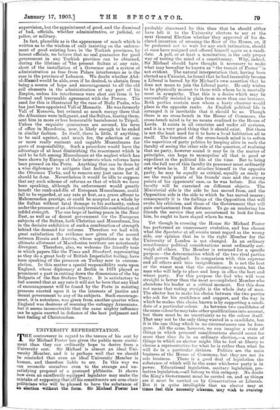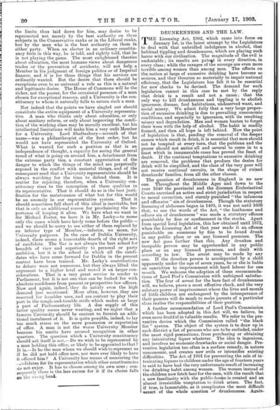UNIVERSITY REPRESENTATION.
THE controversy in regard to the tenure of his seat by Sir Michael Foster has given the public more excite- ment than they can ordinarily hope to derive from a University seat. Sir Michael is almost an ideal Uni- versity Member, and it is perhaps well that we should be reminded that even an ideal University Member is human, and therefore liable to err. In this way we can reconcile ourselves even to the strange and un- satisfying proposal of a postcard plAbiscite. It shows how even an excellently equipped legislator may make the mistake of supposing that all his constituents are arm-chair politicians who will be pleased to have the substance of in election without the form. Sir Michael Foster has probably .discovered by this time that he should either have left it to the University electors to say at the next General Election whether they approved of his de- clared intention of crossing the floor of the House, or, if he preferred not to wait for any such intimation, should at once have resigned and offered himself again as a candi- date. A poll, or at least a nomination, is the only proper way of testing the mind of a constituency. Why, indeed, Sir Michael should have thought it necessary to make what may hereafter be known as "the transit of Foster" is not evident. The natural interpretation that, having been elected as a Unionist, he found that he had insensibly become a Liberal is barred by Sir Michael's own assertion that he does not mean to join the Liberal party. He only wishes to be physically nearest to those with whom he is mentally most in sympathy. That this is a desire which may be successfully resisted is plain from more than one instance. Both parties contain men whom a hasty observer would place in the opposite ranks. As English political life is arranged it is inevitable that it should be so. Though there is no cross-bench in the House of Commons, the cross-bench mind is by no means confined to the House of Lords. It exists in all countries and under all systems, and it is a very good thing that it should exist. But there is not the least need for it to have a local habitation all to itself. The function of the cross-bench mind is to soften the asperities of party politics by keeping alive in each the faculty of seeing the other side of the question, of realising that no party, however sound, it may be in the matter of principles, can hope to monopolise all that is good or expedient in the political life of the time. But to bring out the full use of this faculty its possessor must ordinarily stay where he is. If he attaches himself to the opposite party, he may be equally as critical, equally as ready to see the weak points of his friends' case and the strong points of his opponents' case, as he was before. But the faculty will be exercised on different objects. The Ministerial side is the side he has moved from, and the Opposition side is the side to which he has moved nearer; consequently it is the failings of the Opposition that will evoke his criticism, and those of the Government that will gain enchantment from distance. To go on rendering his friends the service they are accustomed to look for from him, he ought to have stayed where he was.
Yet though in crossing the House Sir Michael Foster has performed an unnecessary evolution, and has chosen what the Spectator at all events must regard as the wrong side, our opinion that he is the right Member for the University of London is not changed. In an ordinary constituency political considerations must ordinarily out- weigh all others. The Member is returned for a specific purpose—the determination which of the two rival parties shall govern England. In comparison with this supreme end all others sink into insignificance. It is not the best or the wisest man that the constituency wants, but the man who will help to place and keep in office the best and wisest party. For this purpose the fool who will vote straight is better than the most accomplished Member who abandons his leader at a critical moment. But this does not mean that voting straight is the whole duty of man. The elector has to make his choice between the two parties who ask for his confidence and support, and the way in which he makes this choice known is by supporting a candi- date of a particular colour. As between two candidates of the same colour he may take other qualifications into account, but there must be no uncertainty as to the colour itself. That may not be the only thing wanted in a candidate, but it is the one thing which in no circumstances can be fore- gone. All the same, however, we can imagine a state of things in which personal considerations should count for more than they do in an ordinary election,—a state of things in which an elector might like to feel at liberty to choose a representative for what he is rather than what he will do in a particular division. Politics are the main business of the House of Commons, but they are not its sole business. There is a (=God deal of legislation the substance of which will be the same whichever party is in power. Educational legislation, sanitary legislation, pro- tective legislation,—all belong to this category. No doubt the King's Government must be carried on, and as things are it must be carried on by Conservatives or Liberals. But it is quite intelligible that an elector may at times feel this necessity irksome, may wish to overstep the limits thus laid down for him, may desire to be represented not merely by the best authority on these subjects in the Conservative ranks or in the Liberal ranks, but by the man who is the best authority on them in either party. When an elector in an ordinary constitu- ency feels in this way, he is told, and rightly told, that he is not playing the game. The most enlightened theories about education, the most humane views about dangerous trades or the prevention of accidents, will not help a Member in his judgment of foreign politics or of Imperial finance, and it is for these things that his services are ordinarily wanted. But the desire that there should be exceptions even to so universal a rule as this is a natural and legitimate desire. The House of Commons will be the richer, not the poorer, for the occasional presence of a man chosen for exceptional reasons, and a University is the con- stituency to whom it naturally falls to return such a man.
Not indeed that the points we have singled out should constitute the entire equipment of a University representa- tive. A man who thinks only about education, or only about sanitary reform, or only about improving the condi- tion of the working class may be morally excellent, but his intellectual limitations will make him a very unfit Member for a University. Lord Shaftesbury—seventh of that name—was a philanthropist of the first order, but he would not have represented the University of Oxford. What is wanted for such a position as that is an independence of thought, a capacity for seeing the general trend of what is going on around him, a detachment from the extreme party ties, a constant " appreciation of the danger to which the things of the mind are perpetually exposed in the conflict with material things, and of the consequent need that a University representative should be always watching for the time to defend them. It is matter for rejoicing, therefore, when a University con- stituency rises to the conception of these qualities in its representative. That it should do so is the best justi- fication for the maintenance of what but for this would be an anomaly in our representative system. That it should sometimes fall short of this ideal is inevitable, but that is only an additional reason for proclaiming the im- portance of keeping it alive. We have what we want in Sir Michael Foster, we have it in Mr. Lecky—to name only the cases which have lately come before the public— and we should be sorry to see either of them replaced by an inferior type of Member,—inferior, we mean, for University purposes. In the case of Dublin University, indeed, there seems a lamentable dearth of the right sort of candidate. The Bar is not always the best school for breadth of view and superiority to personal or party ambition, but it is the school in which all the candi- dates who have come forward for Dublin in the present contest have been trained. Mr. Lecky's contributions to debate were not numerous, but they always lifted the argument to a higher level and rested it on larger con- siderations. That is a very great service to render to Parliament, but it is not one that can be looked :for with absolute confidence from present or prospective law officers. Now and again, indeed, they do satisfy even the high demand just mentioned. More often, however, they are reserved for humbler uses;and are content to play their part in the rough-and-tumble strife which makes so large a part of Parliamentary life. A due supply of this latter quality seems never wanting, and we regret that a famous University should be content to furnish an addi- tional instalment of it. It is quite possible, indeed, to lay too much stress on the mere possession or expectation of office. A man is not the worse University Member because his merits have secured recognition in other quarters. The question which a University constituency should ask itself is not,—Do we wish to be represented by a man holding this office, or likely to be appointed to that ? It is,—Is he the man whom we should wish to represent us if he did not hold office now, nor were ever likely to have it offered him ? A University has means of measuring the c.ndidates for its representation which other constituencies do not enjoy. It has to choose among its own sons ; con- sequently there is the less excuse for it if its choice falls on the wrong head.











































 Previous page
Previous page